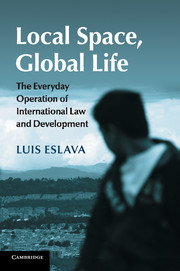Book contents
4 - Development changes places
Published online by Cambridge University Press: 05 August 2015
Summary
Colombia is not the only place in which the axiom of the nation-state as the ideal platform for development has been contested. Since the 1970s, a gradual transformation has taken place in development and global governance thinking that consolidates the position of the local jurisdiction instead of the nation-state as a more fertile context for the development project. This chapter reviews the normative, discursive and disciplinary elements of this shift from the national to the local topos.
As in Chapter 3 my discussion here is based on the persistent relationship between the international development project and nation-building efforts in the Third World since the end of the Second World War. In this chapter, I review this relationship as it has played out in the Colombian state and, more particularly, how the translation of development responsibilities to local jurisdictions has reformulated the tenets and mechanics of Colombian nation-building efforts. As will be shown, ideas of progress, economic growth and fiscal disciplining – some of the key themes of the development discourse since its inception – have accompanied the movement to the local level. Operating in a new demographic, spatial and administrative configuration, this chapter will show how these ideas have acquired a new intensity as the validating force for the recurrent deployment of disciplinary practices upon (local) life and space.
From an ethnographic perspective, one important question that arises in this context is that of how – by what mechanisms – the decentralization process has transferred the capacity to exercise authority once assigned to central state agencies and programmes to local administrations. Paying attention to this question reveals how processes of decentralization have not only constituted localities as new spatial units of development that can be organized and defined according to normative and planning technologies, but have also converted the local into a new level of governance. It is precisely the potential for reterritorializing and refining the exercise of authority over space and population through well-defined local jurisdictions that drives the current fascination with the local level.
- Type
- Chapter
- Information
- Local Space, Global LifeThe Everyday Operation of International Law and Development, pp. 139 - 173Publisher: Cambridge University PressPrint publication year: 2015



